Oasis Divers, Osprey Beach Hotel, Grand Turk, BWIContents of this Issue: Small Hope Bay Lodge, Andros Island, Bahamas Oasis Divers, Osprey Beach Hotel, Grand Turk, BWI In One Month, Five Divers Have Died in Florida Ninety-Nine Years and Counting Two Classic Memoirs by Stan Waterman Diving With Grim Purpose (continued) Can Sharks Learn to Hunt Lionfish? Sydney Shark Kills Swimming PADI Instructor Are All Diving Instructors Up to The Job? Big and Unnecessary Disappointments Boy Dies When Trainee Divers Go Missing Editorial Office: Ben Davison Publisher and Editor Undercurrent 3020 Bridgeway, Suite 102 Sausalito, CA 94965 an old haunt revisited after the long lay-off from the April, 2022 issue of Undercurrent
Dear Fellow Diver: Having fond memories from 25 years ago of diving with Oasis Divers and Everette, its owner, I wanted to return to replenish my treasured memories. After all, Grand Turk has a great wall just a few hundred feet offshore, calm waters, and lovely people. Yet, as the trip neared an end, I recalled an Agatha Christie quote: "You can never go back . . . one should never try to go back."
On my first dive, I joined divemasters Mackey and Jason on the sand at 30 feet under the boat. In 100-foot visibility, we dropped over the edge of the spectacular wall. Eighty feet down, I watched two hunters with Hawaiian slings each spear a lionfish. One, two, and then three gray reef sharks glided around the corner of a huge coral monolith and made a couple of passes, getting within 30 feet of the hunters. They then dropped the fish, and the sharks scooped them up. Those who hunt lionfish say the fish make distress sounds when speared. Sharks, sensitive to these sounds or vibrations, appear from nowhere. I went up to the shallows at 30 feet to coral reefs interspersed with sand patches and lots of small reef fish. The coral was only in fair shape, but sizeable healthy sea fans and soft corals added interest. Reef squid schooled in midwater, a couple of turtles visited, as did a large barracuda. Garden eels rose from their holes, scouting for morsels, while tilefish hovered in the water around their holes. We enjoyed poking around in the shallow, sandy seagrass areas. I watched a small octopus wander around the mooring, then began to surface 50 minutes after the start of the dive. During the dive, my air tasted slightly strange. After the dive, others talked about a strong taste, motor oil vapor, they thought, and noted that their cylinders had been overfilled to 3900 psi or more. Mine was 3500 psi. We told Dale, the dive shop manager, who immediately had all cylinders loaded on a truck and carried away to the compressor, wherever it was (it was not at the dive shop). Whatever the cause -- poorly monitored fills, the lack of proper maintenance, or limited use during the past two years -- the rest of the week, the tanks were filled to 2900 psi to 3200 psi, and the air was tasteless. The COVID shutdown probably affected this and a lot of elements of Oasis' operation. Although they have had nitrox in the past and still advertise it, it wasn't available there, or apparently anywhere on the island. Try as I might, I could not find out who owned the compressor, if it was the only one on the island, and where it was. But I did learn that Dale and Everette, now divorced, had sold Oasis to a cruise ship line during the COVID slowdown. I stayed at the beachfront Osprey Beach Resort Hotel, a 200-yard walk down the quiet road lined with yard-high whitewashed stone walls to Oasis Divers. Walk another quarter mile, and you're in Cockburn Town, reminiscent of an old English seaside village, with houses dating back 200 years and now exuding a beautiful Creole atmosphere. On the stone walls along the shaded lane are large bronze plaques naming the original inhabitants of the quaint restored homes, some now B&Bs.
Oasis' two 45-foot, twin-outboard pontoon boats easily handled the 30 divers who came in my group from our local dive shop. We loaded up on the beach across the road from the dive shop, which had a freshwater rinse for suits and cameras, a bathroom, and a freshwater shower. Each boat had large sunshades, bottled water, a camera bucket, and first aid equipment, but no head for what could be nearly a three-hour two-tank morning trip. It was a giant stride into the water and a three-foot climb back into the boat. Thankfully, the divemasters lifted our gear from the water if we asked. After a day of diving, we left whatever gear we wanted at our dive station on the boat overnight. It was ready and set up the following morning. Essentially it's concierge diving provided by great divemasters.
A site called the Aquarium lived up to its name. Not only were there swarms of reef fish, but also I saw schools of horse-eyed jacks while an occasional wahoo passed by. Here was the healthiest looking coral on the island with the largest and most colorful coral heads. Because of warm and cool upwellings along the walls, the water temperatures varied between 77 and 80 °F. (Topside, it was a constant of 80 to 82°F, clear, with short rain showers providing lots of beautiful rainbows.) All diving is done mainly in the marine park, which has permanent dive boat moorings. On some dives, our boat would drop anchor on the sand, which can still do some damage to the underwater environment. The reason, unfortunately, was that several fixed mooring pins no longer had mooring lines with floats attached. One divemaster told me that the marine park could not keep up with maintenance due to the lack of money, with two years of little business. The entire dive community suffered, which meant not only deteriorating moorings but also compressor problems, boat maintenance, nitrox availability, limited supplies in the dive shop, and who knows what else. But, everyone was doing their best to cope. The competent divemasters -- Roger, Timmy, Jason, and Archie -- were laid-back and universally great at spotting critters and helping photographers' interests. Dive rules and restrictions were reasonable: try to stay shallower than 100 feet, have a buddy, and come back with enough air to make a safety stop at 10-15 feet. And don't be rude to others by staying down long, over an hour.
The seven-mile-long Grand Turk island is in the middle of the Humpback migratory path, which they travel from January to early April, so a whale snorkeling tour was a must. On separate days, my group split up to ride a 36-foot twin-hull with two large 115HP outboards, a Bimini-type sunshade, a sound system, snacks, and beer. The group had some excellent closeups of humpbacks on the first afternoon's trip, but I was not so lucky the next day. After several attempts to get close to a shy mother and a very young calf, I could only shoot the south end of a huge whale heading north. This 50-foot-long humpback mother with a baby was uncomfortable with a noisy boat approaching too close, then dropping a dozen noisy snorkelers into the water. At many whale watching venues, the boat will stop several hundred yards ahead of the whales and hope they keep coming in their direction. In other cases, the mother boat will tow an RIB with a small outboard. When they spot whales, they stop short and transfer snorkelers to the RIB, which approaches slowly, hopefully quietly, even paddling the last few meters. The snorkelers then carefully slip into the water just ahead of the whale, hoping not to disturb it. The crew didn't seem to know about this technique, so I described it. I wonder if they'll pick up on it? It would mean more closeups with whales and happier guests.
Oasis traditionally takes guests for a snorkel and barbecue to Gibbs Caye, a small uninhabited island five miles from Grand Turk. The divemasters showed me how, in chest-deep water, to pick and hold a stingray with something like the tonic immobility techniques used to mesmerize sharks. One boat pontoon took some divers over the horizon to free dive for queen conch for the barbeque. However, after three hours, the conch hunter's boat was nowhere in sight. A half-hour later, it appeared on the horizon, hardly moving. We quickly packed up the beach picnic, and our boat went to the rescue, eventually towing the disabled craft back to Grand Turk, arriving after dark but enjoying a happy hour of finishing off the picnic beer in the coolers. Deja Vu all over again!
My takeaway is that the economic effect from the two years of COVID slowdown has hobbled the operation: compressor problems, no nitrox, repeated serious boat breakdowns. Hopefully, the return of customers and cash flow will correct the issues. So, I will surely return for the good diving and the lovely old style of Grand Turk, but not in a heartbeat. That won't be enough time for them to solve their problems, and as I know, I can never really go back. Yesterday will never be tomorrow. -- D.D. Our undercover author's bio: The author is a master diver, has been diving for more than 30 years, making 1600 dives around the world. Retired from rebreather and technical diving, he is a DAN undersea referral physician and has written several pieces for Undercurrent.
|

I want to get all the stories! Tell me how I can become an Undercurrent Online Member and get online access to all the articles of Undercurrent as well as thousands of first hand reports on dive operations world-wide
| Home | Online Members Area | My Account |
Login
|
Join
|
| Travel Index |
Dive Resort & Liveaboard Reviews
|
Featured Reports
|
Recent
Issues
|
Back Issues
|
|
Dive Gear
Index
|
Health/Safety Index
|
Environment & Misc.
Index
|
Seasonal Planner
|
Blogs
|
Free Articles
|
Book Picks
|
News
|
|
Special Offers
|
RSS
|
FAQ
|
About Us
|
Contact Us
|
Links
|
3020 Bridgeway, Ste 102, Sausalito, Ca 94965
All rights reserved.

 The two years of COVID-19 caused many worldwide dive operators to slow their activities, hibernate, fall into a coma . . . . or even disappear. Now that those who survived are getting back on the road, a diver can expect a few speed bumps, as I discovered in February on Grand Turk.
The two years of COVID-19 caused many worldwide dive operators to slow their activities, hibernate, fall into a coma . . . . or even disappear. Now that those who survived are getting back on the road, a diver can expect a few speed bumps, as I discovered in February on Grand Turk.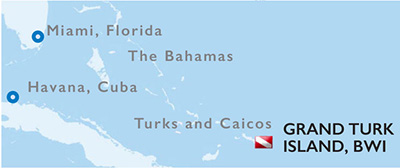 The two-story Osprey sits on a beautiful 200-yard beach with perfect sand and
a fine swimming/snorkeling area. The hotel accommodates about 40 people, mostly in
clean two-bed efficiency apartments with a kitchenette,
microwave, coffeemaker, refrigerator, cable
T.V., and spotty Wi-Fi. There's an outdoor dining
area, a small pool, and a poolside bar, where an
excellent blues guitarist played one weekend evening. About 6:30 every morning, I'd join others
for coffee and bagels on the Osprey patio to watch
spouting Humpback whales, mothers and their babies,
showing their flukes and tails, even breaching just
off the edge of the reef wall, about 200 yards
away, as they head back to the North Atlantic
from their winter on the Silver Banks. During our
morning dives, we frequently heard whale songs;
the wailing or thundering calls were very loud,
although they could have been miles away.
The two-story Osprey sits on a beautiful 200-yard beach with perfect sand and
a fine swimming/snorkeling area. The hotel accommodates about 40 people, mostly in
clean two-bed efficiency apartments with a kitchenette,
microwave, coffeemaker, refrigerator, cable
T.V., and spotty Wi-Fi. There's an outdoor dining
area, a small pool, and a poolside bar, where an
excellent blues guitarist played one weekend evening. About 6:30 every morning, I'd join others
for coffee and bagels on the Osprey patio to watch
spouting Humpback whales, mothers and their babies,
showing their flukes and tails, even breaching just
off the edge of the reef wall, about 200 yards
away, as they head back to the North Atlantic
from their winter on the Silver Banks. During our
morning dives, we frequently heard whale songs;
the wailing or thundering calls were very loud,
although they could have been miles away.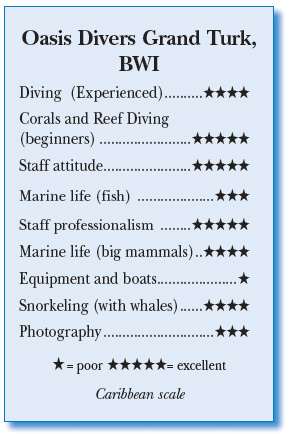 With two morning and one afternoon dive, I made a leisurely 14 dives in six
days. One of my favorite dives was McDonald's Arches, which seemed just as good
as I remembered from 25 years ago. Visibility was at least 75 feet with a bit of
surge and no current (as usual). I kicked through the perfect swim-thru arch on
the edge of the wall, where I spotted a reef shark cruising and packs of horseeyed
jacks and bar jacks. Small schools of yellow-tailed snapper hung farther off the wall. A small pod of Atlantic bottlenose dolphins came by so quickly that I couldn't get my video system booted. Later, on the shallower reef, an octopus posed for some pictures. Here, which is typical for the shallows on top of the wall, I saw the queen and gray angelfish, rock beauties, four-eyed and spotfin butterflyfish, bluestripe and French grunts, porkfish, schoolmasters, dusky damsels, sergeant majors, blue chromis by the thousands, and chub. Overall, the hard corals had relatively healthy patches interspersed with areas not doing so well. The soft corals and sea fans were in good condition at all the dive sites.
With two morning and one afternoon dive, I made a leisurely 14 dives in six
days. One of my favorite dives was McDonald's Arches, which seemed just as good
as I remembered from 25 years ago. Visibility was at least 75 feet with a bit of
surge and no current (as usual). I kicked through the perfect swim-thru arch on
the edge of the wall, where I spotted a reef shark cruising and packs of horseeyed
jacks and bar jacks. Small schools of yellow-tailed snapper hung farther off the wall. A small pod of Atlantic bottlenose dolphins came by so quickly that I couldn't get my video system booted. Later, on the shallower reef, an octopus posed for some pictures. Here, which is typical for the shallows on top of the wall, I saw the queen and gray angelfish, rock beauties, four-eyed and spotfin butterflyfish, bluestripe and French grunts, porkfish, schoolmasters, dusky damsels, sergeant majors, blue chromis by the thousands, and chub. Overall, the hard corals had relatively healthy patches interspersed with areas not doing so well. The soft corals and sea fans were in good condition at all the dive sites.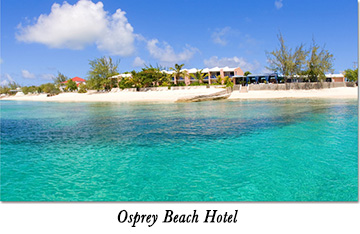 After the second a.m. dive, The Sandbar restaurant, 100 feet down the road from the dive shop, was an excellent place to have lunch, with splendid chicken and shrimp quesadillas, burgers, and such. Be prepared for the ubiquitous friendly island dogs under your table, looking for a snack.
After the second a.m. dive, The Sandbar restaurant, 100 feet down the road from the dive shop, was an excellent place to have lunch, with splendid chicken and shrimp quesadillas, burgers, and such. Be prepared for the ubiquitous friendly island dogs under your table, looking for a snack.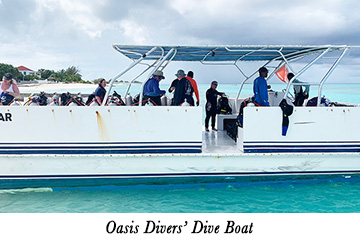 As we prepared to head back, our boat developed engine trouble, and it took several hours to limp the 10 miles to Grand Turk. Luckily, the seas were only two-foot swells, the sun was up, and the weather was good; it became an excuse to finish the beer placed in the cooler for the excursion. See the pattern here? Equipment problems seemed to keep popping up!
As we prepared to head back, our boat developed engine trouble, and it took several hours to limp the 10 miles to Grand Turk. Luckily, the seas were only two-foot swells, the sun was up, and the weather was good; it became an excuse to finish the beer placed in the cooler for the excursion. See the pattern here? Equipment problems seemed to keep popping up!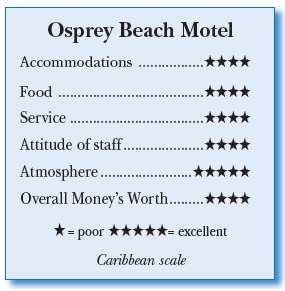 While the Osprey offers dinner (grilled ribs,
chicken, steaks, nothing fancy), my go-to spot for
dinner with friends became the Secret Garden at
the Salt Raker Inn, about 100 feet from the Osprey
Inn. This eclectic garden restaurant with a dirt
floor is tucked behind an old colonial house that
dates to about 1800. Enrica, the owner, was our
prompt server, accompanied by three cats trailing
along behind. The Turks Head Inn, farther down the
street, has a far more polished outdoor dining atmosphere, and similarly excellent
food. It's reportedly owned by a Hollywood production company that houses its
crews here when filming. On the other side of the island by bike or cart ride lies
the Bohio Resort (and dive operation), which has weekend live music and entertainment.
And, you never know when you'll come across a wild donkey or a big brown
friendly dog wandering on the road. The Osprey lobby/pool area gates keep the
dogs and donkeys at bay and out of the pool. The big brown friendly dogs roam the
island looking for a pat on the head, a sack, or even a swim in the sea.
While the Osprey offers dinner (grilled ribs,
chicken, steaks, nothing fancy), my go-to spot for
dinner with friends became the Secret Garden at
the Salt Raker Inn, about 100 feet from the Osprey
Inn. This eclectic garden restaurant with a dirt
floor is tucked behind an old colonial house that
dates to about 1800. Enrica, the owner, was our
prompt server, accompanied by three cats trailing
along behind. The Turks Head Inn, farther down the
street, has a far more polished outdoor dining atmosphere, and similarly excellent
food. It's reportedly owned by a Hollywood production company that houses its
crews here when filming. On the other side of the island by bike or cart ride lies
the Bohio Resort (and dive operation), which has weekend live music and entertainment.
And, you never know when you'll come across a wild donkey or a big brown
friendly dog wandering on the road. The Osprey lobby/pool area gates keep the
dogs and donkeys at bay and out of the pool. The big brown friendly dogs roam the
island looking for a pat on the head, a sack, or even a swim in the sea. Divers Compass: Several airlines fly to the principal island of
Providenciales, where you can hook up with a Caicos Express Airways
Beechcraft 1900 for the one-hour flight to Grand Turk (GDT) .
. . . Turks and Caicos Islands website has an electronic visa
application for travelers to document their COVID-related status
before departure from the USA. This electronic visa application
must be approved before you can board a flight to Provo, so you
cannot do it on your smartphone at your departure gate. Just go to
Divers Compass: Several airlines fly to the principal island of
Providenciales, where you can hook up with a Caicos Express Airways
Beechcraft 1900 for the one-hour flight to Grand Turk (GDT) .
. . . Turks and Caicos Islands website has an electronic visa
application for travelers to document their COVID-related status
before departure from the USA. This electronic visa application
must be approved before you can board a flight to Provo, so you
cannot do it on your smartphone at your departure gate. Just go to 